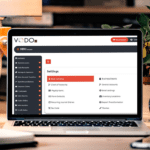ERP systems (Enterprise Resource Planning) are one of the key technological tools that contribute to improving the efficiency of companies and comprehensively managing their operations. In this article, we will provide a comprehensive overview of ERP systems, starting from their definition and moving on to the benefits they offer and the challenges that may arise during their implementation.
What are ERP systems?
ERP systems are integrated software systems designed to organize and manage all of a company’s operations and departments comprehensively. These systems rely on a central database that collects data from various departments within the company, such as production, sales, human resources, finance, and the supply chain. They then analyze this data and provide accurate and real-time reports to aid in strategic decision-making.
Enterprise Resource Planning systems aim to enhance work efficiency and increase productivity by unifying operations and data, thereby facilitating management processes and reducing administrative and procedural costs. Thanks to their accuracy and high level of integration, companies can rely on ERP systems to analyze data comprehensively, improve demand forecasting, and enhance supply chain management. This contributes significantly to achieving their strategic goals more efficiently.
In addition, flexible and adaptable solutions enable companies to respond to rapid changes in the market and customer requirements, thereby enhancing their competitiveness and sustainability in the modern business environment.
What are VODO systems?
VODO ERP system is an integrated system designed to meet the needs of small, medium, and large companies alike. VODO ERP aims to organize and manage all company operations comprehensively through the use of a central database. The system allows for the aggregation of data from all company departments such as production, sales, human resources, and finance, facilitating analysis and strategic decision-making processes.
Within the framework of VODO , there are simple and user-friendly interfaces that enhance user experience and reduce learning curves. The system also supports integration with external applications and other software solutions, making it easier for companies to adopt new technologies and keep up with technological advancements.
Thanks to its flexibility and adaptability, VODO is considered an ideal solution for companies aiming to improve their operational efficiency, increase productivity, and achieve comprehensive integration in managing their resources and meeting strategic objectives efficiently and effectively.
The main benefits of ERP systems
1. Improving work efficiency:
ERP systems reduce process duplication and increase productivity efficiency by allowing employees to quickly access unified and accurate information.
An example of improving work efficiency using VODO ERP
One of VODO ERP’s clients, a manufacturing company, faced challenges in managing operations and coordinating between departments such as production, procurement, inventory, sales, and finance. These challenges included data fragmentation, decreased work efficiency due to delayed responses between departments, and difficulties in making strategic decisions due to inconsistent data.
VODO Enterprise Resource Planning Solution:
By implementing VODO , significant improvements were achieved in work efficiency and inter-departmental coordination. Here’s how it happened:
Unified Data: VODO ERP’s centralized database unified data from various departments like production and sales, saving considerable time in information retrieval and reducing errors from disparate data.
Improved Responsiveness: Response times between departments were accelerated through VODO ERP’s notification and alert system, enhancing order processing speed and improving customer service.
Enhanced Planning and Decision Making: Advanced reports and analytics provided by VODO ERP enabled management to make informed strategic decisions based on accurate and real-time data.
Operational Efficiency: VODO enabled the company to manage resources more effectively, including production planning, inventory management, and logistics optimization, resulting in improved production processes and reduced administrative costs.
Outcome:
Using VODO, the company successfully improved work efficiency significantly, leading to better overall organization, increased productivity, and enhanced customer satisfaction. The system also contributed to reducing operational costs and enhancing competitiveness in the market, underscoring the importance of adopting advanced technologies like VODO ERP in achieving growth and sustainability goals for companies.
Implementation and Maintenance Costs of ERP Systems: Challenges and Strategies
ERP systems are a significant investment for companies, requiring careful implementation and maintenance costs to ensure the maximum benefit from this vital technology. This article addresses the challenges related to ERP implementation costs and how to effectively manage them.
Challenges of Implementation Costs:
1. Software and licensing costs:
Enterprise Resource Planning implementation costs include the expenses for purchasing the software and related licenses, which can be high depending on the company’s size and unique needs.
2. Customization and integration costs:
Companies may need to customize Enterprise Resource Planning systems to meet their specific needs, which increases costs and requires additional technical and human resources.
3. Training and learning costs:
Companies need to invest in training employees to use the new Enterprise Resource Planning system, which requires investments in time, effort, and educational resources.
Challenges of Maintenance Costs:
1. Routine maintenance costs:
Maintenance costs include software updates, bug fixes, and ensuring data security, requiring regular and ongoing investments.
2. Ongoing training
Maintenance operations require ongoing training for employees on new updates and best practices, necessitating investments in continuous training and education.
Implementing and maintaining ERP systems require careful strategy and meticulous planning to ensure achieving the desired return on investment, enhancing operational efficiency, and organizational flexibility. By selecting the appropriate deployment model and carefully evaluating service providers, companies can reduce costs and achieve outstanding performance that supports the sustainability of their operations in the future.
Cost Reduction Strategies by VODO"
The costs of implementing and maintaining ERP systems require a well-thought-out strategy and careful planning to ensure the desired return on investment, and to enhance the company’s operational efficiency and flexibility. By selecting the appropriate deployment model and carefully evaluating service providers, companies can reduce costs and achieve outstanding performance that supports the sustainability of their business in the future.
VODO ERP has developed robust strategies to significantly reduce costs, making it an attractive option for companies seeking to maximize the value of their Enterprise Resource Planning system without incurring traditional high costs. Here are some of the strategies followed by VODO ERP:
1. Free System and Cloud Server Maintenance:
VODO ERP offers free system and cloud server maintenance for its clients. This means that companies do not need to make additional investments to maintain system stability and data security, which helps reduce overall operational costs.
2. No Licensing Costs:
The VODO ERP system does not impose licensing costs on small and medium-sized enterprises, allowing these companies to benefit from all system features without the need to pay additional expenses associated with licenses. This makes VODO Enterprise Resource Planning a financially sustainable option for companies of various sizes.
3. Improved Integration and Operation:
By offering integrated and easily integrable solutions, VODO ERP can provide an efficient user experience and improve operational efficiency without the need for significant investments in customizing and integrating the system with the company’s existing work environments.
4. Exceptional Training and Technical Support:
VODO ERP offers intensive user training services and exceptional technical support, helping companies reduce costs associated with system learning and training while ensuring efficient usage without unnecessary expenses.
5. Easy Integration with External Applications:
In essence, VODO ERP’s strategies for cost reduction present a genuine opportunity for companies to leverage cutting-edge ERP technology at minimal expense. This enables them to achieve their strategic objectives and bolster their competitive edge in the market.
In essence, VODO ERP’s strategies for cost reduction present a genuine opportunity for companies to leverage cutting-edge Enterprise Resource Planning technology at minimal expense. This enables them to achieve their strategic objectives and bolster their competitive edge in the market.
Customization and integration into ERP systems: the foundation of effectiveness and operational excellence
Enterprise Resource Planning systems have become vital tools for businesses today, providing a comprehensive foundation for efficiently managing all company operations. With the diverse and unique needs of businesses, customization and integration within ERP systems become necessary to ensure full and optimal utilization of this vital technology.
The Importance of Customization in ERP Systems
Meet the company's needs
Each company has unique needs related to its operations and organizational structure, and this is where customization in Enterprise Resource Planning comes into play. Companies can modify and adapt ERP systems to fit their specific requirements such as unique processes, reporting requirements, and workflow streams.
2. Improving User Experience
Through customization, companies can design user interfaces that align with their employees’ needs, facilitating data input and extraction processes. This increases employee satisfaction and enhances their efficiency.
3. Increasing Operational Efficiency
Customizing the system to meet company requirements can improve production processes, inventory management, and resource planning with greater accuracy and efficiency. This reduces administrative costs and enhances the company’s responsiveness to market demands.
The Importance of Integration in ERP Systems
1. Data Unification
Integration allows for the collection and unification of data from various departments within the company such as finance, sales, and production. This unification facilitates comprehensive reporting and advanced analytics, which support strategic decision-making.
2. Supporting System Communication
Through integration, companies can seamlessly connect their ERP system with other platforms such as Customer Relationship Management (CRM) systems, Supply Chain Management (SCM) systems, and other pertinent systems, fostering enhanced internal and external collaboration efforts.
3. Enhancing Performance and Flexibility
Through seamless integration, companies can enhance their operational performance and increase flexibility to adapt to market changes and customer requirements. This enhances their competitiveness and innovation capabilities.
The Outcome
In summary, customization and integration in Enterprise Resource Planning systems form the vital foundation for achieving operational efficiency and competitive excellence for companies. By addressing unique company needs, unifying data, and facilitating communication across different systems, companies can fully leverage ERP technology to achieve their strategic objectives and strengthen their position in the competitive market.
Security in ERP Systems: Challenges and Effective Strategies
Challenges in ERP System Security
1. Complexity of the Security Environment
ERP systems integrate with a variety of applications and other systems, increasing the complexity of the security environment and making it challenging to track and protect all potential vulnerabilities.
2. Advanced Cyber Attacks
ERP systems face increasing threats from advanced cyber attacks such as malware, breaches, and phishing attempts, which target unauthorized access to sensitive data or the complete disruption of the system.
3. Organizational and Legislative Challenges
Companies must comply with a variety of regulations and security standards such as GDPR in Europe and HIPAA in the United States, adding additional pressures to secure data and comply with required security standards.
Effective Security Strategies for ERP Systems
1. Enhancing Security Awareness
Companies must enhance employees’ awareness of the importance of cybersecurity and necessary preventive measures, such as using strong passwords and regularly updating antivirus software.
2. Implementing Secure Access Procedures
Implementing stringent access procedures that define permissions based on the principle of least privilege, providing different levels of access to employees according to their roles.
3. Encrypting Data
VODO system encrypts sensitive data during transmission and storage to ensure confidentiality and protection against unauthorized access.
4. Regular System Updates and Maintenance
“The Information Security team at VODO regularly updates ERP systems and core software to patch known security vulnerabilities, enhance system stability, and improve security performance. It’s worth noting that VODO has never experienced any security breaches throughout its operational history, despite facing numerous persistent attacks.”
Adopting Advanced Security Solutions:
- VODO utilizes advanced security solutions such as threat detection systems and malware protection to effectively handle modern cybersecurity threats through globally experienced companies in this field.
Information Security Summary:
Information security in ERP systems presents a continuous challenge that requires innovation and rapid response to advanced protection technologies. By adopting effective security strategies and enhancing security awareness, companies can achieve strong data protection for sensitive information, thereby enhancing customer trust and compliance with global security standards.
Common ERP Modules:
Enterprise Resource Planning systems are vital tools in today’s business world, combining multiple modules designed to enhance operational efficiency and streamline daily business operations within companies. This article discusses common modules within ERP systems and their roles in supporting business operations and achieving organizational success.
Human Resources (HR):
The HR module in an ERP system aims to efficiently manage human resources within the enterprise, including:
- Managing employee information such as personal data, employment, and performance.
- Tracking attendance, leaves, and absences.
- Managing recruitment and training processes.
- Providing support in professional development and performance management.
Finance and Accounting:
This module facilitates the management of financial and accounting aspects within the organization, including:
- Managing accounts payable and accounts receivable lifecycles.
- Financial reporting and general ledger.
- Analyzing financial performance and providing financial reports to senior management.
- Managing fixed assets, tracking consumption, and repairs.
Customer Relationship Management (CRM):
The CRM module focuses on improving customer experience and satisfaction through:
- Documenting and managing customer communications.
- Enhancing sales, marketing, and service operations.
- Analyzing data to understand purchasing behaviors and improving marketing strategies.
- Providing a platform for managing marketing campaigns and measuring their effectiveness.
Supply Chain Management (SCM):
The SCM module improves supply and distribution efficiency through:
- Demand-driven production planning and scheduling.
- Supplier relationship management and improving purchasing terms.
- Cost reduction, quality improvement, and timely delivery.
- Efficient inventory tracking and management for continuous supply chain improvements.
Production Management
This module helps plan and organize production operations within the factory, including:
- Organizing internal supply chains and production processes.
- Monitoring quality and specifications in manufacturing operations.
- Improving efficiency, reducing waste, and costs.
- Enhancing resource planning and productivity through modern technology.
Business Intelligence - BI
The BI module provides strategic insights for intelligent decision-making through:
- Analyzing data to extract trends and insights.
- Providing advanced reports that support leadership operations and decision-making.
- Monitoring performance and measuring results based on specific standards.
- Supporting predictions and strategic planning for the future.
Operations Management:
Operations Management
The Operations Management module focuses on improving daily operational efficiency within the enterprise, including:
- Coordinating and monitoring operations through an integrated system.
- Planning and scheduling daily activities and resource distribution.
- Improving workflow and reducing gaps between different departments.
- Providing a platform for real-time productivity tracking and performance analysis.
Contract and Procurement Management:
This module aims to streamline procurement operations and contract management through integration, including:
- Managing contract lifecycles from negotiations to execution.
- Improving purchasing terms and cost reduction through procurement strategies.
- Monitoring supplier performance and evaluating according to set standards.
- Providing a platform to enhance inventory management and accurately identify purchasing needs.
Quality and Compliance Management:
This module focuses on ensuring quality and compliance with standards in all production and service operations, including:
- Applying and monitoring international standards and specifications.
- Managing inspection operations and quality assurance.
- Monitoring compliance with legal and regulatory standards.
- Providing regular reports on product quality, service quality, and compliance.
Learning and Development Management:
he Learning and Development Management module aims to enhance the capabilities and skills of employees within the enterprise, including:
- Identifying training needs and developing appropriate educational programs.
- Tracking and evaluating training performance and measuring effectiveness.
- Providing a platform for self-directed learning and professional development.
- Supporting sustainable learning and development strategies within the enterprise.
Logistics and Distribution Management:
This module focuses on organizing transportation and distribution operations and efficiently managing supply chains, including:
- Planning and organizing shipping and delivery operations.
- Improving workflow between different logistics units.
- Providing solutions to reduce transportation costs and increase efficiency.
- Monitoring and evaluating shipping partner performance and enhancing logistical cooperation.
E-commerce
The E-commerce module in ERP facilitates online business operations, including:
- Managing the online store, products, and prices.
- Processing orders and managing shipping and distribution operations.
- Enhancing the shopping experience for customers and increasing interactions.
Marketing Management
The Marketing Management module focuses on achieving marketing goals and increasing brand awareness, including:
- Planning and executing marketing campaigns across various channels (digital and traditional).
- Analyzing data and providing analytical reports to understand the impact of marketing campaigns.
- Managing customer relationships and social interactions.
- Improving marketing strategies based on effective data and analytics.
By utilizing these modules, companies can enhance their business strategies and improve their performance across a wide range of channels and operations, contributing to achieving success and sustainable growth in today’s business market.
VODO Enterprise Resource Planning provides a comprehensive solution for companies seeking to improve their operations and increase efficiency. By offering a wide range of modules covering all aspects of business, VODO Enterprise Resource Planning contributes to achieving success and sustainable growth for companies in various industries. Whether you are looking to enhance HR management, improve financial efficiency, or enhance customer experience, VODO ERP provides the tools and features you need to achieve your business goals.








